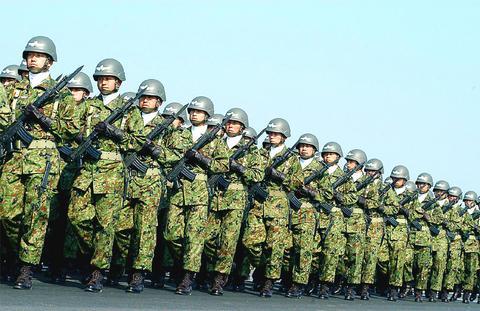Japan's ruling party yesterday endorsed a defense outline that would relax the nation's arms export ban and allow development and production of a missile defense system with the US, Japanese media reported.
The reported approval by the ruling Liberal Democratic Party's (LDP) defense panel paves the way for today's Cabinet approval and official announcement of the new outline of Japan's defense plan for next fiscal year.

PHOTO: EPA
The LDP panel also approved a 3.7 percent cut in defense spending to a total of ?24.24 trillion (US$233 billion) for the next five years, following an agreement reached between the defense and finance ministries, Japanese newspapers reported.
A plan to trim the Ground Self Defense Force to 155,000 by slashing 5,000 from the current level was also approved.
The new guidelines call for an easing of Japan's arms exports ban so that the nation can jointly develop and produce a missile defense system with the US, Kyodo News reported.
Japan in 1967 banned weapons shipments to communist bloc nations, countries under UN arms embargoes or those engaged in conflicts. The ban was extended in 1976 to exports to all foreign countries.
Chief Cabinet Secretary Hiroyuki Hosoda will make an official announcement Friday, Kyodo said. Both the LDP and the Defense Agency refused to comment on yesterday's reports.
The new defense outline, which covers a period from April 1 next year through March 31, 2009, wears away at Japan's postwar policy to maintain a self-defense-only military.
The outline singles out China and North Korea as regional security concerns, and calls for a more assertive role by the military with "prompt, mobile, multifunctional and effective defense capabilities," Kyodo said.
Japan has been reviewing its defense policy amid threats from possible terrorist attacks and North Korea. The North has become one of Tokyo's biggest security worries; it test-fired a long-range ballistic missile over Japan in 1998 and has an active nuclear weapons program.
Japan's postwar pacifist constitution renounces use of force in settling international disputes.
Japanese forces possess short-range missiles under a defensive policy that falls within government interpretations of the constitution.
In a nod to preserving that policy, Japanese leaders set aside a plan to develop long-range missiles capable of making a pre-emptive strike in foreign territory, news reports said.
The LDP's coalition partner, the Komeito party, reportedly opposed the plan.
Also see story:

MAKING WAVES: China’s maritime militia could become a nontraditional threat in war, clogging up shipping lanes to prevent US or Japanese intervention, a report said About 1,900 Chinese ships flying flags of convenience and fishing vessels that participated in China’s military exercises around Taiwan last month and in January last year have been listed for monitoring, Coast Guard Administration (CGA) Deputy Director-General Hsieh Ching-chin (謝慶欽) said yesterday. Following amendments to the Commercial Port Act (商港法) and the Law of Ships (船舶法) last month, the CGA can designate possible berthing areas or deny ports of call for vessels suspected of loitering around areas where undersea cables can be accessed, Oceans Affairs Council Minister Kuan Bi-ling (管碧玲) said. The list of suspected ships, originally 300, had risen to about

DAREDEVIL: Honnold said it had always been a dream of his to climb Taipei 101, while a Netflix producer said the skyscraper was ‘a real icon of this country’ US climber Alex Honnold yesterday took on Taiwan’s tallest building, becoming the first person to scale Taipei 101 without a rope, harness or safety net. Hundreds of spectators gathered at the base of the 101-story skyscraper to watch Honnold, 40, embark on his daredevil feat, which was also broadcast live on Netflix. Dressed in a red T-shirt and yellow custom-made climbing shoes, Honnold swiftly moved up the southeast face of the glass and steel building. At one point, he stepped onto a platform midway up to wave down at fans and onlookers who were taking photos. People watching from inside

Japan’s strategic alliance with the US would collapse if Tokyo were to turn away from a conflict in Taiwan, Japanese Prime Minister Sanae Takaichi said yesterday, but distanced herself from previous comments that suggested a possible military response in such an event. Takaichi expressed her latest views on a nationally broadcast TV program late on Monday, where an opposition party leader criticized her for igniting tensions with China with the earlier remarks. Ties between Japan and China have sunk to the worst level in years after Takaichi said in November that a hypothetical Chinese attack on Taiwan could bring about a Japanese

STREAMLINED: The dedicated funding would allow the US to transfer equipment to Taiwan when needed and order upgraded replacements for stockpiles, a source said The US House of Representatives on Thursday passed a defense appropriations bill totaling US$838.7 billion, of which US$1 billion is to be allocated to reinforcing security cooperation with Taiwan and US$150 million to replace defense articles provided to the nation. These are part of the Consolidated Appropriation Act, which the US House yesterday passed with 341 votes in favor and 88 against. The act must be passed by the US Senate before Friday next week to avoid another government shutdown. The US House Committee on Appropriations on Monday unveiled the act, saying that it allocates US$1 billion for the Taiwan Security Cooperation Initiative